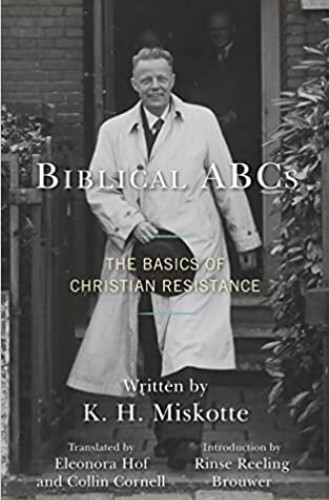Back to basics with a Dutch Nazi resistor
K. H. Miskotte wrote a Karl Barth for Dummies in 1941. It offers a bracing challenge today.
An associate pastor on my staff once completed a two-year master’s degree in theology specific to her area of ministry practice. When I tried to congratulate her, she waved me off, in tears, pointing to my collection of Karl Barth’s Church Dogmatics and asking, “Why didn’t they make me read books like that?”
There was a day when pastors devoured Barth. The famous Dutch pastor K. H. Miskotte devoured the first book of the second volume of the Dogmatics over the course of 48 hours when it arrived in the mail (with a short break to preach to his congregation). He needed the sustenance. He was trying to reintroduce Christian faith to its Jewish roots and to lead the church in the Netherlands to resist the occupying Nazis, with his family taking the risk of sheltering Jews in their home. Miskotte channeled Barth in his own work, now translated into English for the first time as Biblical ABCs.
If you or I were writing a primer on Christian resistance today, we would likely focus on antiracism training or diagnosing authoritarian trends in media and culture. Much good work is afoot in those directions, and Miskotte’s work might seem a distraction. It is an intensely biblical meditation on the name of God and the basics of divine revelation. It is Karl Barth for Dummies in Dutch in 1941. As we in the anglophone world learn about Miskotte from translation efforts like this one, what will we find?
A bracing challenge. I think of myself as a sort of Barthian, yet I found Miskotte pushing back at much of how I view scripture.
I have preached to try to re-enchant the world. Creation means something, and in an age of ecocatastrophe we need to see that meaning anew. Miskotte’s day was different. Those practicing natural theology—in which meaning is read from the pages of creation—often wound up neck-deep in Nazism. Miskotte drew on his training in Jewish philosophy, especially that of Franz Rosenzweig, to insist that scripture is altogether anti-pagan, and paganism is the natural condition of humanity. Creation has a sort of radiance, no doubt. That’s why every human being is tempted to worship it. The revelation of God in Torah interrupts that temptation and leaves us with nothing more or less than the divine name: God’s own self, underived from us, given by God alone. “Paganism projects divine names out of experience of life in the world,” Miskotte writes. “But humans cannot seize the knowledge of God. It must be given to them.”
When North Americans today read our magisterial forebears from less than a century ago, they can sound simply conservative to us: here’s this doctrine, there’s that verse, everybody behave. Europeans in that day did not know America’s fundamentalist/modernist controversies. But they did know flat-footed pietism and had no patience for it. The question is “not whether or not one knows many texts by heart,” Miskotte writes. Rather, a genuine “bible believer” has “learned the anti-pagan and anti-religious character of the Bible.” Natural religion is simply a demonic projection of humanity’s aspirations onto the heavens. The revelation of God’s own name dethrones such idols: “Paganism projects divine names out of the experience of life in the world.” Scripture instead seeks people who are “bending under the Teaching.”
I was struck by the presence in Miskotte’s work of so much theology that I’d thought to be recent. Postliberal theologians influenced by Wittgenstein often focus on the language we use for God. Languages have uniqueness and integrity; they are not reducible to being the same as each other deep down. This focus on language can frustrate some critics: to liberals, it can look like a safe, intramural activity; to conservatives, it unhelpfully brackets the key question of how our language refers to the reality it renders. But if we are indeed in a moment when we have lost the basic grammar of divine language, then a biblical ABC from a Nazi resister and shelterer of Jewish friends might be just the thing we need. Barth may seem dusty, but my associate colleague is right on: let’s wade back in there, fortified by learning from Jewish wisdom.
No book can do everything. Miskotte’s work here is fragmentary, as is most occasional writing amid resistance. Barth’s work is too, despite its 6 million words. All of our work is too. Biblical ABCs is a marvel, and highly recommended. I wonder what Nazi censor was asleep at the switch when Miskotte wrote this:
I read somewhere that a person who professes to be Christian first and Dutch second should be considered a saboteur. Well, this confession is so self-evident that the church has never thought otherwise; this confession belongs to the church’s very being. It is nonsense to dispute this obvious truth, but for the unchurched it is not obvious.
When all falls apart, perhaps we return to the basics. I can think of few better primers than Miskotte’s surprising work of grace.





